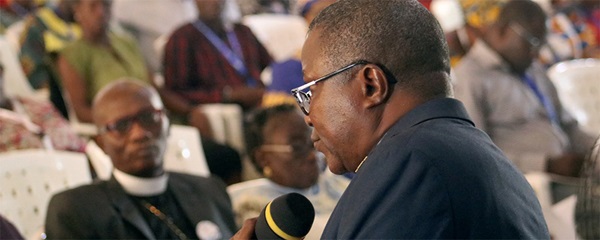Liberian United Methodists say they won’t support a proposed separation plan for The United Methodist Church without major amendments, and they call on other African members to join in pushing for those changes at the now rescheduled 2021 General Conference.
Your support of The General Administration Fund apportionment implements trustworthy administrative oversight like the General Conference sessions.
A resolution approved Feb. 14 by the denomination’s Liberia Conference at its regular annual meeting in Ganta also expresses unhappiness over having no direct input in the development of the Protocol of Reconciliation & Grace Through Separation.
Under the protocol, traditionalist churches could leave with their properties and form their own denomination, getting $25 million in United Methodist funds. Another $2 million would be set aside for other church groups that might decide to leave.
The Liberia Conference resolution — approved 725-0, requires Liberia’s General Conference delegates to work with other Africans to amend the financial aspects of the plan and lower the percentage of votes needed for a conference to decide to leave The United Methodist Church.
“The protocol as it stands has lots of faults, with a colonial underpinning,” said the Rev. Jerry Kulah, who leads the Liberia Conference delegation.
The Liberia resolution calls for removing language from the protocol that conferences would remain in The United Methodist Church unless they vote to leave.
The resolution also says that “any attempt to align or subjugate all central conferences and their annual conferences to a post-separation UMC by default, as the protocol proposes, would be viewed as an act of colonialism and injustice against the central conferences.”
While the protocol calls for conferences to have at least a 57 percent vote to leave The United Methodist Church, the resolution says that a simple majority should be the margin by which conferences or churches decide their denominational affiliation.
The resolution also asserts the right of the Liberia Conference and the African central conferences to retain the name “United Methodist Church” and the use of the cross-and-flame logo with “appropriate modifications,” though those are not spelled out.
“The only way the participants in the mediated negotiation could achieve a unanimous agreement was to resolve those issues in the way they are addressed in the protocol,” said Boyette, president of the traditionalist Wesleyan Covenant Association. “Had we persisted in holding to the poisons expressed in the resolution, unanimity would not have been achieved and a protocol would not have been signed.”
Efforts to amend it would be understandable but a gamble, said the Rev. Thomas Lambrecht, vice president of the traditionalist advocacy group Good News.
“We hope to arrive at a unified strategy with the Africa Initiative and delegates from Europe and the Philippines in approaching the protocol,” Lambrecht said. “We will do a lot of listening and problem-solving together.”
excerpt from a story by Julu Swen, communicator in Liberia and Sam Hodges, Dallas-based writer for UMNS
One of seven apportioned giving opportunities of The United Methodist Church, the General Administration Fund implements trustworthy administrative oversight, supports the legislative processes of the church and curates The United Methodist Church’s rich history. Please encourage your leaders and congregations to support the General Administration Fund apportionment at 100 percent.





